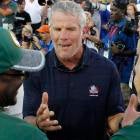The NFL has done a good job of making the game of football safer in recent years, but it will never be a safe game. Players who spent years in the NFL understand that, especially as new information comes out about the long-term effects of concussions. Concussion studies and documentaries have become a part of the media culture, and a new one is about to be released: "Shocked," a documentary that explores "the hidden factor" in sports-related brain injuries.
Specifically, "Shocked," which premieres on WatchStadium.com this Thursday, Jan. 11 at 6:30 p.m. ET, explores the issues caused by athletes hitting artificial surfaces with their heads during the course of games. One of the athletes the filmmakers include in the documentary is former Packers quarterback and Hall of Famer Brett Favre, who told CBS Sports ahead of the release that learning more about concussions has dramatically changed the way he perceives the game.
In fact, Favre said that he is "not going to encourage them to play" football and, while he won't stop them from doing so, he would vastly prefer they play a "safer" sport like golf if they pursue athletics.
"I have three grandsons -- and people may wonder why a retired player would be so adamant about concussions and making the environment safer -- I don't know if they'll play football. They're eight [years], three [years] and several months old," Favre said on the CBS Sports Pick Six Podcast. "What little bit I know now -- and it's more than when I played -- concussions [are] not good. And definitely not for a youth. And so, there is something out there that can make the environment safer, aside from helmets, and that is the surface. I think you have to look at the surface as an equal if not more important than the equipment you wear."
Asked specifically about which direction he would push them, Favre said he wouldn't discourage his grandsons from pursuing football, but he would definitely prefer it if they decided to spend their time playing golf.
"I'm not going to encourage them to play. I'm not going to discourage [them]," Favre said. "But I say this to everyone who will listen: if my grandsons were to say, and they call me Paw-Paw, if they were to say 'Paw-Paw, will you be my caddy in golf, I think I'm going to do golf instead of football,' I would be much more happy, satisfied and excited by that then by them playing football.
"Every tackle I would be cringing, hoping they get up and not shaking their head and saying they got a headache. But the likelihood of that happening by them playing football is very high. So I'd much rather them choose a safer route."
Back in 2013, Brett Favre described the play that ended his career, noting that he was knocked out for "10 to 15 seconds" after being hit by Corey Wooten of the Bears. Even then, Favre pointed out that he didn't get that hard -- he called it "one of the most minor hits" he had ever taken -- but the ground was "solid ice, it was like concrete" and when he hit his head on the ground it knocked him unconscious.
We often think about concussions happening as a result of helmet-to-helmet hits, but Favre and the filmmakers, as well as researchers, believe the type of surface sports are played on might have a much more significant impact on head injuries than people understand.
Listen to Favre talk about "Shocked," as well as the Packers' recent changes, the Saints-Vikings game and the Raiders hiring Jon Gruden on the Pick Six Podcast below. Subscribe to the podcast on iTunes here.
Preview the documentary on ShockedDoc.com and watch it when it premieres on WatchStadium.com on Thursday, Jan. 11 at 6:30 p.m. ET.
















